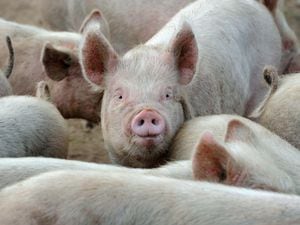Pig farm relocation plan to spare residents from smell
Plans to relocate an intensive pig farm are set to be approved in an effort to spare nearby residents from the smell.

The owners of Manor Farm on the outskirts of Sheriffhales want to move their pig rearing operation to a site further away from the village, and fund the move by developing the current site for housing.
Both sets of plans are to be decided by Shropshire Council’s southern planning committee next week and officers recommend the new pig farm be approved.
But officers say the separate application for the development of the current site, including the conversion of the traditional barns alongside the construction of 31 new homes, should be rejected as the site is in ‘open countryside’ and the scheme would impact the village conservation area and listed buildings.
If both sets of plans are approved, the more modern farm buildings will be demolished and like-for-like replacements built on the new site one mile from Sheriffhales, accessed via a track off the A5 rather than a lane through the village as is currently the case.
The farm is currently subject to a court order limiting its operations, after a court ruled it was creating a statutory nuisance in the form of odour.
Reports to the committee say Shropshire Council’s regulatory services team has backed the relocation of the pig farm, saying the new facility – which will house up to 2,000 pigs – will resolve the odour complaints.
But Sheriffhales Parish Council says it has “little confidence” in this, given that the current pig farm was permitted to operate in the belief that it would not result in an unacceptable odour, which has proven not to be the case.
More than 20 members of the public have also objected to the applications, with further concerns raised over road safety and traffic, and fears that he farm could grow even further on the new site.
The pig farm report, by planning officer Richard Fortune, says: “Due to the large separation distances from receptors that would be achieved by the proposed site, the proposed development would not have a significant impact on the amenity of residents in the locality and other sensitive receptors including the school, by reason of odour and noise, taking into account the prevailing wind and management practices.
“The permanent cessation of intensive livestock use of the current farm buildings, to avoid any cumulative effects, is a key factor in this conclusion on amenity impacts.”
However Mr Fortune’s report on the residential development points out that under planning policy, Sheriffhales is classed as ‘open countryside’ meaning new open market housing is not normally permitted.
Mr Fortune says: “The desirability of relocating the intensive pig rearing enterprise to another location as a solution to a odour problem which constitutes a statutory nuisance is accepted, but the proposal to fund a new pig farm by residential redevelopment of the existing site is not one which can be supported as a material consideration sufficient to justify a departure from the adopted development plan.”
The report goes on to say that the scheme would impact the setting of nearby heritage assets and the village conservation area, and that the public benefits from the relocation of the pig farm “would not outweigh” this.
Both applications will go before the committee next Tuesday.





